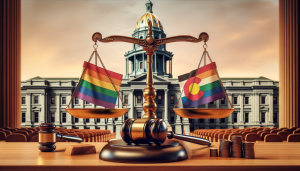Trans people are officially classified as ‘mentally ill’ in Peru, sparking fury among LGBT groups

Peru has classified trans peoples as’mentally sick’.
According to the decree signed by the President Dina Boluarte ‘transsexualism and dual-role transexualism in childhood, gender identity disorders, other gender identities, fetishistic travestism are all now recorded as mental diseases.
Rights groups are furious about the move. It comes days before the World Health Organisation celebrates the 34th anniversary of the removal of homosexuality as a disease from the International Classification of Diseases.
In 2019, the WHO removed transsexuality as a disease from its manual when a proposed new version of ICD came into force in 2022.
|
The Peruvian government claims that the decree will allow those who are affected to receive a ‘psychological therapy’ at no cost. It also’reaffirms categorically respect for dignity and freedom of action within the frameworks of human rights and provides health services in their interest’.
Rights groups have warned that including transgender and intersex individuals as mentally ill may open the door for conversion therapy in Peru, which is currently prohibited.
South America has a reputation of intolerance towards transgenderism, and LGBTQ.
The authorities closed the criminal complaint of Azul Rojas, a transgender woman, in 2008. She was brutally raped by three police officers and then tortured.
Azul was treated with torture and violence by her Peruvian judiciary, which angered rights groups. The Inter-American Commission of Human Rights ruled in 2018 that Azul’s treatment constituted discriminatory violence and torture.
The Inter-American Court of Human Rights found that Peru was responsible for the sexual and physical violence perpetrated by Peruvian Police Officers against Azul in 2020, after Peruvian Authorities continued to ignore findings and requests for compensation.
The Peruvian authorities didn’t acknowledge their guilt until November 2022 when the Minister of Justice apologized to the victim. However, the compensation has yet to be decided.
Percy Mayta Tristan, a researcher in Lima’s Scientific University of the South and a medical doctor, commented on the new decree. He said that it showed a lack of understanding of the complex LGBT issues.
He told Yahoo News that ‘you can’t ignore context’, referring to the fact that the LGBT community is denied rights in this society and the labeling of them as mentally ill allows conversion therapy.
In Argentina, three women died in an arson incident last week when a man threw a Molotov Cocktail at the homes of two lesbian pairs in Buenos Aires.
The attack on May 6, widely viewed as a hate-crime, shocked many people in a country that prides itself in being a pioneer in Latin America for gay rights.
Officials said that a man aged 62 threw Molotov cocktails into the boarding house, where lesbian couples were living, and set it on fire. The perpetrator has been arrested.
Both women died of burn injuries.
Maria Rachid, of the LGBT+ Federation, said that the third victim died on Sunday morning at 10 am.
Only the fourth woman suffered minor injuries.
Last week, dozens of people lit candles in a vigil outside the boardinghouse. Another event was held on Friday near the National Congress to demand justice.
Argentina is a Latin American leader when it comes to gay marriages and identity legislation. A law passed in 2021 allows nonbinary individuals to mark their gender by an “X”.
Many fear that their liberties will be eroded under the libertarian president Javier Milei.
The Buenos Aires Women’s Ministry wrote that this hate crime was not isolated. It said it was a result of the government’s irresponsible discourse.
Milei, who took office in December last year, has abolished the women’s ministry, the anti-discrimination organization, and prohibited the use of gender inclusive language in the military.









No Comments